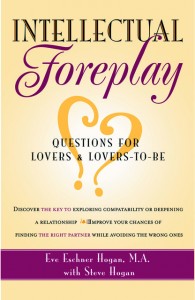Looks Good, Feels Good…How do you know if it IS good? Practice Intellectual Foreplay!
Intellectual Foreplay: Questions for Lovers and Lovers-to-Be
 “Any couple, whether dating or already married, will get great value from using Intellectual Foreplay. It will deepen their understanding of themselves and each other.”
“Any couple, whether dating or already married, will get great value from using Intellectual Foreplay. It will deepen their understanding of themselves and each other.”
—Jack Canfield, Co-author: Chicken Soup for the Soul and author of The Success Principles
“Ninety percent of any good relationship is in the casting. Intellectual Foreplay is an wonderful place to start, for anyone looking to cast the right leading man or woman in the movie of their dreams!”
—Jeff Arch, Screenwriter, “Sleepless in Seattle”
Do You Practice Intellectual Foreplay?
The following excerpt was taken from Intellectual Foreplay: Questions for Lovers and Lovers-to-Be
Thus it began. Suddenly, I realized I wasn’t sure what I truly needed to know. While considering the upcoming phone call, I casually asked everyone I knew, “What should you ask someone before you get seriously involved?” To my surprise, everyone had an answer! Before long I had a lengthy list of questions—written on napkins, the back of receipts, anything available. The questions ranged from bathroom habits to deep spiritual philosophies to practical lifestyle inquiries. Finding the variety of questions fascinating, I kept asking, and the list kept growing. Unknowingly, we had begun the compilation of this book. Putting the list of questions to the test, we took it to the telephone and explored the myriad of topics together, adding to it nightly.
In essence, we engaged in Intellectual Foreplay in our relationship, which led to my moving to Maui and marrying Steven. It was then that it occurred to us that other people might need assistance in that “getting-to-know-each-other” stage, too. Since Steven owns a scuba-diving company on Maui, he continued to gather questions by interviewing his customers each day on the boat, while I added some valuable concepts for raising self-esteem and developing healthy relationships to the text. Soon, our friends started asking for copies of the “book” to use with their dates.
What Is Intellectual Foreplay?
“Foreplay” literally means “the play that comes first,” the play that you engage in before you go the distance together. We generally think of this in physical terms: foreplay builds intrigue, excitement, and desire—creating readiness—before sex. Foreplay is time well spent, because it makes the whole experience more satisfying. Intellectual Foreplay offers a variation on this idea: it is the stimulation and interest that is created between two people when they communicate effectively. Intellectual Foreplay means taking the time to discuss important questions with a prospective partner and to discover compatibility before you “go the distance” and make a commitment to a relationship. Just like its physical counterpart, Intellectual Foreplay can build excitement and desire—or quickly reveal a lack of compatibility, saving you months, or even years, of developing a relationship that isn’t going to work.
Intellectual Foreplay asks you to use your head and your heart before sharing your body and your life. We are all aware of the immediate power of physical attraction and its ability to vanish once we get to know someone better or to linger long after any traces of a healthy relationship remain. The compatibility that is developed through truly knowing someone before getting seriously involved can increase attraction and facilitate the longevity and quality of the union. This well-spent time can simply make your relationship better, stronger, and more satisfying.
By learning all you can about your partner, discussing issues before they become problems, revealing unexpressed agreements and assumptions, and looking deeply at what matters to you, your chances of making the right choice of partner will greatly increase. You cannot be a victim of ignorance when you go into a relationship conscious, knowing your choices. Intellectual Foreplay will also help you to make choices within the relationship that will keep love alive, helping you to avoid the painful experience of breaking up.
One of the biggest mistakes we make at the beginning of a relationship is not asking enough questions. When taking on any other endeavor—a business relationship, buying a house, buying appliances—we wisely ask a whole host of questions to ensure that we make the right choice. Can you imagine buying a house because it looks good and feels good without examining the costs, the condition of the property, serious damage, needed repairs, your readiness to move, your commitment to the payments, the previous owner’s readiness to sell, what the neighbors are like, and on and on? Yet that is exactly what we do in relationships. We base our choices solely on physical attraction and emotional desire, and then can’t understand why our relationships don’t work. Intellectual Foreplay is a tool for getting to know yourself and your partner in a deep and practical way, thus enabling you to make healthy, educated decisions.
FOURplay
The central idea of Intellectual Foreplay is the practice of FOURplay—getting to know each other 1) intellectually, 2) emotionally, 3) spiritually, and 4) physically before making the commitment to serious involvement. Granted, if you think too much about your relationship, you may never get married. However, if you think too little, you’ll surely get divorced.
We are all pretty familiar with the standard questions that are usually asked when two people meet: “What’s your name?” which is usually followed quickly by, “What do you do?” or “Do you live around here?” And, if we are wise, we try to find out early on whether someone is married or has a partner or a house full of kids. Usually we inquire about these things indirectly, with a question such as, “Do you live alone?” While these are excellent places to start, this is the point where most people stop asking and just start dating. As you’ll discover in this book, there is a lot more you can discover about someone (and yourself) by asking more questions!
Getting the Most Out of This Book
As you look through Intellectual Foreplay, you’ll find that the book is divided into eight major sections. Part One, “Using Your Head and Your Heart,” discusses the nuts and bolts of Intellectual Foreplay and shows you how to get the most out of this process. Here you will learn how to approach Intellectual Foreplay with a partner, what to do with the answers you receive, and how to make it fun for both of you! It is very important that you read Part One before jumping into the sections that list questions. The tools provided in Part One will make handling the information in the rest of the book much easier and the process much more meaningful, rather than just entertaining.
Parts Two through Six are where you will find the questions to explore with a partner. They have been organized into useful categories that explore different aspect of your partner’s (and your own) life and character. These categories, or chapters, are further organized around broader questions: Who are you, where did you come from, where are you going, can we live together, and where are we going?
These questions, and the order of the chapters in the book, are meant to serve as guidelines for you; there is no need to proceed rigidly through the sequence of questions in the order they’re presented here. Choose the sequence that best fits your and your partner’s comfort level with the topics and the extent to which your relationship has already developed. But one word of warning: we suggest that you avoid exploring the sex chapter (which falls at the end of the book) with a potential partner until you have read the rest of the book, or, at the very least, Part One. Think of the rest of the book as foreplay—it will make the sex chapter (and your relationship) better if you go though the book first!
Part Seven, “Can We Evolve Together?” contains the concluding chapters, “Questions to Ask Yourself” and “Bringing Out the Elation in rELATIONships.” These chapters will guide you through the process of getting clear about whether you and your partner should be together, and if so, maintaining peace within your relationship and keeping your love alive. Elation, or joy, is an important component of healthy relationships, and it is yours for the creating.
In addition to many questions for exploring a relationship with your partner, Intellectual Foreplay offers guidelines for evaluating your own and your partner’s responses. Whether you’re on a first date, are deciding whether to take the next step, or are already committed to a relationship, Intellectual Foreplay is a fun—and useful—tool for discovery. As you encounter your next potential partner, be sure to ask, “Do you practice Intellectual Foreplay?” as a prerequisite to the date!
There are nearly 2000 questions in the book for you to pick and choose from, focusing on those that are most relevant to you. Here is a sampling of the chapters and a basic question from each. While these may look simple, let me assure you, answering them is not always as simple as it may seem.
SELF-ESTEEM
How do you feel about yourself? Which qualities do you like and dislike?
APPEARANCE/ATTRACTION
How important is physical attraction?
ENTERTAINMENT, SPORTS and HOBBIES
What do you like to do for fun?
PAST
How is your past affecting you now?
COMMUNICATION
How well do you communicate, verbally, visually, physically, and telepathically?
TIME
How do you typically use your time?
RELIGION and SPIRITUALITY
What are your spiritual beliefs?
MORALS, VALUES, ETHICS and BELIEFS
What are your values and how do you prioritize them?
ROMANCE
What does romance mean to you and how important is it?
COMMITMENT and TRUST
What do you want out of a relationship now?
FUTURE
How do you see yourself in the future?
EDUCATION
What is your educational background?
FAMILY
What is your relationship with your family like?
FRIENDS
Who are your closest friends and why?
MONEY
How do you see yourself financially?
HEALTH
How is your health and how do you maintain or improve it?
WORK
What do you do for work and how do you feel about it?
HABITS
What habits do you have that you like and don’t like?
KITCHEN AND MEALS
Describe your eating habits, peculiarities and preferences.
HOUSEHOLD
What are your beliefs about household chores…who should do what?
BATHROOM
What are your requirements for happily sharing a bathroom?
HOME
What are your preferences for the ideal home and climate?
VEHICLES
Describe yourself as a driver and vehicle owner.
PETS
What are your views on pets, do you have them and how do you treat them?
PLANTS AND GARDEN
How do you feel about plants and gardens?
VACATIONS
Describe your ideal vacation.
HOLIDAYS
What are your favorite holidays and how do you spend them?
CHILDREN
What are your feelings and expectations around having and raising children?
WEDDING
Describe your idea of a perfect wedding.
SEX
How comfortable or willing are you to talk about sex?
QUESTIONS TO ASK YOURSELF
In your heart, do you feel like you are making the right choice by being in a relationship with your partner?
To Order call 808-243-PATH (7284)

Recent Comments